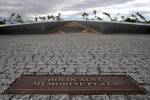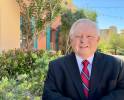Opportunity knocks
Robert Lang, director of Brookings Mountain West, a UNLV-based offshoot of the prominent Washington, D.C., think tank, spoke to the Las Vegas Chamber of Commerce this week at the Four Seasons Hotel. His message to the business leaders was essentially positive about the future.
"This region will grow again," he said. "We are due at least one more mini-boom."
But Lang’s optimism was conditioned on Las Vegas collectively getting its act together. He outlined a plan to position Las Vegas to resume its expansion into a metropolitan hub of the Southwest.
Lang’s top priority is for Nevada to do a better job of securing federal resources. The state is ranked 50th in the nation in the amount of money it receives from the federal government for highways and other projects.
Nevada is hampered, Lang said, by the political attitude that it can handle its own affairs. No other states or cities share this go-it-alone approach. Houston, for example, famously talks a good libertarian game but has no qualms about accepting billions of federal dollars to pay for infrastructure.
Lang mentioned two key transportation projects that could greatly benefit Las Vegas:
— A high-speed rail line to Southern California.
— An interstate highway to Phoenix.
A high-speed rail system would ease the load on McCarran International Airport, which, when times were good a few years ago, was close to reaching its capacity. High-speed rail to Southern California would reduce the number of short flights that fill up McCarran’s runways.
As for the interstate, Lang noted that Las Vegas and Phoenix are the only large American cities of proximity not linked by a major highway. This is because the decisions about where to put interstates were decided decades ago, when Las Vegas was a mere speck on the map, and Phoenix wasn’t much more. A 285-mile interstate between the cities — "Interstate 11" — could boost commercial trade.
The only way to get either of these things done is for the federal government to pay for them.
Lang’s second message was that Las Vegas needs to diversify its economy — "to make stuff, not just consume stuff." The main opportunities, he said, are in renewable energy and technology.
Southern Nevada is in the forefront of solar energy production, and plans recently were announced to build a wind turbine manufacturing facility in the valley.
On the tech side, Las Vegas isn’t likely to challenge Silicon Valley as an incubator of great innovations. But it is ideal geographically to become a major location for digital data storage facilities. This latter idea has a huge future and is a major plank of Democratic gubernatorial candidate Rory Reid’s economic platform.
Why is Las Vegas so attractive? Because it has fewer natural disaster risks than any other area on the continent, Lang said. We don’t have tornadoes, hurricanes, floods or earthquakes that could jeopardize the vital data stored by governments and companies alike. Lang also suggested that lots of data could be stored very safely in Yucca Mountain, which has been all but abandoned as a nuclear waste storage site. And, he said, if Las Vegas were to become a major location for data storage, there are companies that will want to move here to be closer to their data.
Lang said Las Vegas should do even more to attract trade shows to the city. He noted that ComicCon, which has grown into the entertainment industry’s largest trade show, is running out of space in San Diego. Las Vegas is a logical place for it because of our ample floor space and long-standing linkage with Hollywood.
But he suggested a bigger idea: permanent trade shows. Instead of putting up and taking down the big shows, why not keep them going year-round? This model is already happening at the furniture-focused World Market Center, he said, and makes sense for other industry events such as the Consumer Electronics Show.
Lang’s final message: Nevada is grossly under-investing in higher education. Strong research universities are an economic generator on several levels, yet Nevada is cutting rather than expanding. And this is happening while other Western states are improving the reach and prowess of their institutions.
Educated people are more likely to be employed in the current economy, and they are more likely to be employable as we move forward. Construction, for example, is not going to rebound quickly because of the glut of empty buildings.
Nothing in Lang’s presentation really could be considered brand new. But it all makes sense, and it seems possible it could be embraced by business and political leaders across the mainstream political spectrum. Thinking strategically is far more productive than obsessing over the provincial political pissing matches that seem to occupy so much of our time.
Geoff Schumacher (gschumacher@reviewjournal.com) is the Review-Journal’s director of community publications. His column appears Friday.


















